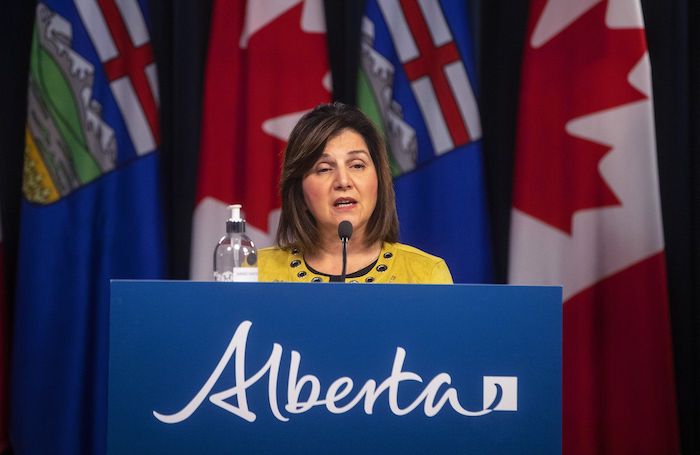Alberta
Province pumping up support for growing school enrolment

Supporting more students in classrooms
Budget 2023 provides more than $820 million over the next three years to support enrolment growth in schools.
Based on strong population growth in Alberta, a large increase in student enrolment is expected in September 2023.
“With Alberta’s rising population, we know many school authorities across the province continue to face growing enrolment pressures. Our strong funding commitment in Budget 2023 will empower school authorities to hire more teachers and obtain more resources for students.”
Over the next three years, Education’s operating expense is increasing by nearly $2 billion. This will support the hiring of approximately 3,000 education staff, including teachers, educational assistants, bus drivers and school support staff, and will help authorities manage growing class sizes.
Funding increases for enrolment will be provided to school authorities through existing grants that include enrolment components. This includes the Early Childhood Services and Grades 1-9 Base Instruction grant and the High School (Grades 10-12) Base Instruction grant, as well as grants in the services and supports category, such as Specialized Learning Support, English as an Additional Language, and Program Unit Funding. The Operations and Maintenance grant also includes an enrolment component. The flexible funding provided allows local authorities to make decisions on how to best use the funding to support their students.
The Funding Manual for School Authorities 2023/24 School Year and projected operational funding profiles are being released March 9, providing school authorities with their funding information for the coming year.
“ASBA is pleased that government has been responsive to school boards’ requests for early release of the funding manual and operational funding profiles, as it assists in informed decision-making. Government’s investment in enrolment growth is welcome news as boards address the growing, diverse and complex student needs within their divisions while remaining accountable to their communities.”
“This funding announcement is timely and much appreciated. In the 2022-23 school year, enrolment at the Calgary Board of Education has grown by more than 5,800 students and we are projecting another significant increase next year. This investment means we can hire additional teachers, educational assistants and other staff to support our growing student population.”
“As one of the fastest-growing school divisions in the province, the funds provided for enrolment growth will help Rocky View Schools hire more staff to support the 1,000 new students we will welcome in the fall. Knowing additional funding will be available is positive news, as RVS continues to experience increasing enrolment pressures across the division.”
“The CASS board of directors recognizes the importance of supporting enrolment growth while maintaining sustainable support for all boards. The early release of the funding manual will assist school authorities in initiating planning needs for the 2023-24 school year.”
“The investment in enrolment growth of Budget 2023 and other increases in grants are most welcome and will greatly help school authorities face significant challenges including high inflation and labour shortage. The association also appreciates the timeliness of the release of the funding manual and recognizes the extraordinary work of the department staff to make this possible.”
Budget 2023 secures Alberta’s future by transforming the health-care system to meet people’s needs, supporting Albertans with the high cost of living, keeping our communities safe and driving the economy with more jobs, quality education and continued diversification.
Quick facts
- Last fall, the government announced a new supplemental enrolment growth grant that provided school authorities with more than $21 million in additional funding. This grant will continue to be available in the 2023-24 school year.
- Alberta Education introduced the Supplemental Enrolment Growth (SEG) grant in the 2022-23 school year to support school authorities with significant enrolment growth.
- The SEG grant provided additional per-student funding for authority enrolment growth of more than two per cent in the 2022-23 school year. The SEG grant, in addition to weighted moving average-based allocations, will provide additional funding to school authorities that have significant growth.
- Over the next three years, the government will provide school authorities with more than $820 million in additional funding to support enrolment growth.
- In the 2020-21 school year, school boards were funded for about 730,000 students and actual attendance was 705,000.
- In the 2021-22 school year, school boards were funded for about 730,000 students and attendance was about 716,000.
- The robust financial health of school jurisdictions continues to be demonstrated by taxpayer funded reserves, reported to be $407 million as of Aug. 31, 2022.
Alberta
Median workers in Alberta could receive 72% more under Alberta Pension Plan compared to Canada Pension Plan

From the Fraser Institute
By Tegan Hill and Joel Emes
Moving from the CPP to a provincial pension plan would generate savings for Albertans in the form of lower contribution rates (which could be used to increase private retirement savings while receiving the same pension benefits as the CPP under the new provincial pension), finds a new study published today by the Fraser Institute, an independent, non-partisan Canadian public policy think-tank.
“Due to Alberta’s comparatively high rates of employment, higher average incomes, and younger population, Albertans would pay a lower contribution rate through a separate provincial pension plan while receiving the same benefits as under the CPP,” said Tegan Hill, director of Alberta policy at the Fraser Institute and co-author of Illustrating the Potential of an Alberta Pension Plan.
Assuming Albertans invested the savings from moving to a provincial pension plan into a private retirement account, and assuming a contribution rate of 5.85 per cent, workers earning the median income in Alberta ($53,061 in 2025) could accrue a stream of retirement payments totalling $454,741 (pre-tax)—a 71.6 per cent increase from their stream of CPP payments ($264,968).
Put differently, under the CPP, a median worker receives a total of $264,968 in retirement income over their life. If an Alberta worker saved the difference between what they pay now into the CPP and what they would pay into a new provincial plan, the income they would receive in retirement increases. If the contribution rate for the new provincial plan was 5.85 per cent—the lower of the available estimates—the increase in retirement income would total $189,773 (or an increase of 71.6 per cent).
If the contribution rate for a new Alberta pension plan was 8.21 per cent—the higher of the available estimates—a median Alberta worker would still receive an additional $64,672 in retirement income over their life, a marked increase of 24.4 per cent compared to the CPP alone.
Put differently, assuming a contribution rate of 8.21 per cent, Albertan workers earning the median income could accrue a stream of retirement payments totaling $329,640 (pre-tax) under a provincial pension plan—a 24.4 per cent increase from their stream of CPP payments.
“While the full costs and benefits of a provincial pension plan must be considered, its clear that Albertans could benefit from higher retirement payments under a provincial pension plan, compared to the CPP,” Hill said.

Illustrating the Potential of an Alberta Pension Plan
- Due to Alberta’s comparatively high rates of employment, higher average incomes, and younger population, Albertans would pay a lower contribution rate with a separate provincial pension plan, compared with the CPP, while receiving the same benefits as under the CPP.
- Put differently, moving from the CPP to a provincial pension plan would generate savings for Albertans, which could be used to increase private retirement income. This essay assesses the potential savings for Albertans of moving to a provincial pension plan. It also estimates an Albertan’s potential increase in total retirement income, if those savings were invested in a private account.
- Depending on the contribution rate used for an Alberta pension plan (APP), ranging from 5.85 to 8.2 percent, an individual earning the CPP’s yearly maximum pensionable earnings ($71,300 in 2025), would accrue a stream of retirement payments under the total APP (APP plus private retirement savings), yielding a total retirement income of between $429,524 and $584,235. This would be 22.9 to 67.1 percent higher, respectively, than their stream of CPP payments ($349,545).
- An individual earning the median income in Alberta ($53,061 in 2025), would accrue a stream of retirement payments under the total APP (APP plus private retirement savings), yielding a total retirement income of between $329,640 and $454,741, which is between 24.4 percent to 71.6 percent higher, respectively, than their stream of CPP payments ($264,968).

Joel Emes
Alberta
Alberta ban on men in women’s sports doesn’t apply to athletes from other provinces

From LifeSiteNews
Alberta’s Fairness and Safety in Sport Act bans transgender males from women’s sports within the province but cannot regulate out-of-province transgender athletes.
Alberta’s ban on gender-confused males competing in women’s sports will not apply to out-of-province athletes.
In an interview posted July 12 by the Canadian Press, Alberta Tourism and Sport Minister Andrew Boitchenko revealed that Alberta does not have the jurisdiction to regulate out-of-province, gender-confused males from competing against female athletes.
“We don’t have authority to regulate athletes from different jurisdictions,” he said in an interview.
Ministry spokeswoman Vanessa Gomez further explained that while Alberta passed legislation to protect women within their province, outside sporting organizations are bound by federal or international guidelines.
As a result, Albertan female athletes will be spared from competing against men during provincial competition but must face male competitors during inter-provincial events.
In December, Alberta passed the Fairness and Safety in Sport Act to prevent biological men who claim to be women from competing in women’s sports. The legislation will take effect on September 1 and will apply to all school boards, universities, as well as provincial sports organizations.
The move comes after studies have repeatedly revealed what almost everyone already knew was true, namely, that males have a considerable advantage over women in athletics.
Indeed, a recent study published in Sports Medicine found that a year of “transgender” hormone drugs results in “very modest changes” in the inherent strength advantages of men.
Additionally, male athletes competing in women’s sports are known to be violent, especially toward female athletes who oppose their dominance in women’s sports.
Last August, Albertan male powerlifter “Anne” Andres was suspended for six months after a slew of death threats and harassments against his female competitors.
In February, Andres ranted about why men should be able to compete in women’s competitions, calling for “the Ontario lifter” who opposes this, apparently referring to powerlifter April Hutchinson, to “die painfully.”
Interestingly, while Andres was suspended for six months for issuing death threats, Hutchinson was suspended for two years after publicly condemning him for stealing victories from women and then mocking his female competitors on social media. Her suspension was later reduced to a year.
-

 Alberta11 hours ago
Alberta11 hours agoMedian workers in Alberta could receive 72% more under Alberta Pension Plan compared to Canada Pension Plan
-

 Uncategorized2 days ago
Uncategorized2 days agoCNN’s Shock Climate Polling Data Reinforces Trump’s Energy Agenda
-

 Opinion1 day ago
Opinion1 day agoPreston Manning: Three Wise Men from the East, Again
-

 COVID-191 day ago
COVID-191 day agoTrump DOJ dismisses charges against doctor who issued fake COVID passports
-

 Business1 day ago
Business1 day agoMark Carney’s Fiscal Fantasy Will Bankrupt Canada
-

 Addictions1 day ago
Addictions1 day agoWhy B.C.’s new witnessed dosing guidelines are built to fail
-

 Education5 hours ago
Education5 hours agoTrump praises Supreme Court decision to allow dismantling of Department of Education
-

 Alberta1 day ago
Alberta1 day agoTemporary Alberta grid limit unlikely to dampen data centre investment, analyst says







